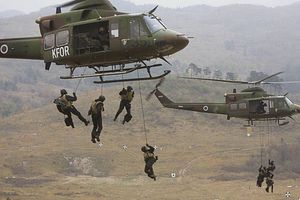Quetta, the capital of Pakistan’s largest province, Balochistan, has been rocked by a series of attacks, the latest of which resulted in 14 injured after a roadside bomb exploded near a judge’s police escort. Days earlier, an incident of unparalleled savagery took place, resulting in the deaths of more than 70 civilians at the emergency ward of a hospital. The casualties mainly consisted of mourners of Bilal Anwar Kasi, the Balochistan Bar Association president who had succumbed to a gun attack earlier that day.
This carnage in Quetta, aimed at the softest targets and condemned worldwide, brings into perspective the evolving threats to Pakistan’s internal security. It also clarifies the motivations of the various terrorist groups that have claimed responsibility, chief among them, the notorious Jamaat-ul-Ahrar, an offshoot of the Tehreek-e-Taliban Pakistan (TTP).
Heinous attacks on soft targets have been previously traced back to the TTP, including the Army Public School massacre in 2014 and the Jinnah International Airport attack. Of the two, the former galvanized the Pakistan Armed Forces toward launching a nationwide crackdown against militancy. On this occasion, however, an attack on a hospital in the provincial capital of Balochistan, Pakistan’s most impoverished and restive province, hints at how the TTP and its affiliates are sending a demoralizing message to the Pakistan Armed Forces: that their efforts in curbing terror since the JIA attack are falling criminally short. Progress made against the militants through initiatives such as the National Action Plan will also be met with a hefty response.
It’s notable that this week’s attacks took place in Balochistan, a state where historically the writ of the state has been repeatedly under challenge. The port of Gwadar in the south of the province acts as a key component of the China-Pakistan Economic Corridor as well, and has the potential to be converted into a new regional hub for Pakistan’s economic growth, fostering trading links with the Middle East. This gives the death toll and the severity of the attack added relevance as rogue groups aim to break even with the Pakistani state.
The threat is now compounded for the Pakistani state given that the Islamic State has also claimed responsibility for the Quetta attack. The group has further managed to penetrate into neighboring Afghanistan. The threat to the Pakistani state is thus multidimensional in nature, with varied terrorist groups employing surprise attacks, either to derail negotiations and peace initiatives or to demoralize the state.
At this point in time, Jamaat-ul-Ahrar has managed to capitalize on relative stability within Pakistan given the gains from Operation Zarb-e-Azb, the military’s nationwide anti-terror campaign, and the defeat of militant groups like ETIP. Yet this latest attack serves as a reminder by the group that despite the best efforts of the Pakistani military in curbing terrorism, reprisals that challenge the writ of the state will continue unabated and should be expected.
Above all, what took place in Quetta this week reflects the new multipronged threats from groups like the Islamic State and the TTP. The subsequent reaction by the central leadership in Pakistan has been to beef up counterterrorism measures in Balochistan. What is required, however, is a deeper understanding of the nature of the threats themselves, which continue to evolve. If the claims of the Islamic State and Jamaat-ul-Ahrar are taken at face value, then a new and dynamic approach by the security forces is required.
Hamzah Rifaat is a research associate at the Global Think Tank Network at the National University of Sciences and Technology and was a 2016 South Asian Voices Visiting Fellow at the Stimson Center.
































